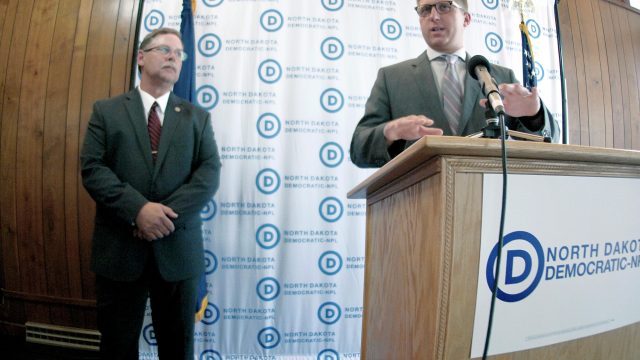Does North Dakota Really Need Democrats?

House Minority Leader Rep. Cory Mock, D-Grand Forks, right, answers questions along with Senate assistant minority leader Sen. John Grabinger, at a press conference in Bismarck on Tuesday requesting North Dakota Attorney General Wayne Stenehjem to withdraw from a Texas lawsuit challenging the Affordable Care Act. 8-7-2018
The Fargo Forum editorial on Sunday argues North Dakota needs more partisan balance.
“No political party, no matter how successful at the ballot box, has a monopoly on good ideas,” they argue. “Public policy benefits when it results from robust debate and clashing viewpoints are melded, incorporating the best ideas from competing sides.”
I agree! The best policies are usually the result of a robust debate, and represent an amalgamation of competing ideas. But do we really need some manufactured degree of partisan balance to achieve that?
To be fair, that’s not what the Forum is calling for. They endorsed the Republican candidates here in North Dakota which contributed to the partisan super majority they now somewhat lament. “We won’t endorse candidates simply for the sake of presenting a tidy slate of candidates that adheres to some ideal of bipartisanship,” they write.
Most who read the Forum’s argument are going to miss that nuance. And, frankly, the Forum’s editorialists are also missing out on just how ideologically diverse our state government is even despite a dearth of Democrats elected to office.
Last week on the radio show I interviewed state Rep. Chet Pollert, a Republican from Carrington who is campaigning to be the new House Majority Leader, and he was talking about one of the challenges of that job being the management of the legislature’s various factions.
Factions which exist because, despite the monolithic presence of Republicans in elected office in our state, among those Republicans there is a lot of divergence in terms of ideas and philosophy and ideology.
Pollert name-checked the Bastiat Caucus, which is a group of libertarian-minded Republicans organized by state Rep. Rick Becker of Bismarck. They are Republicans. They also often disagree with their fellow Republicans on policy, even siding at times with the Democratic minority.
This viewpoint diversity within the North Dakota Republican party has been foundational to their political success since Governor Ed Schafer was elected Governor in 1992.
Democrats struggle to win elected office in North Dakota because their national party has stopped caring all that much about rural America, and because at the local level their candidates spend very little time focusing on ideas or policies North Dakota voters find compelling. But that doesn’t mean the resulting Republican majorities are homogeneous in their outlook on the issues.
They’re not.




